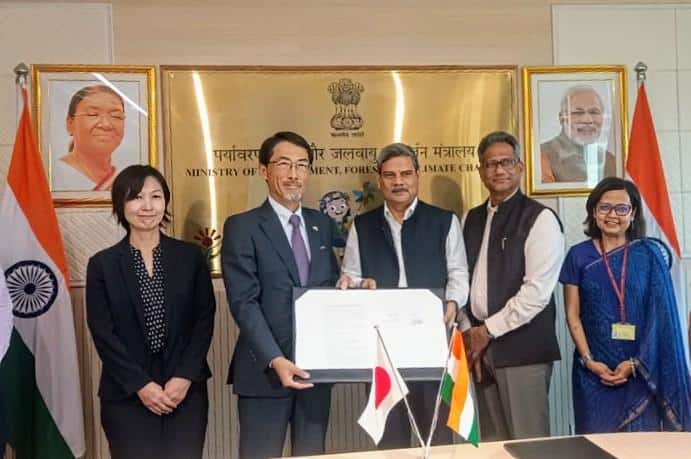India and Japan Sign Memorandum of Cooperation on Joint Crediting Mechanism under the Paris Agreement

The Ministry of Environment, Forest and Climate Change (MoEFCC) of India has recently signed a Memorandum of Cooperation (MoC) with the Government of Japan, focusing on the Joint Crediting Mechanism (JCM) as outlined in Article 6.2 of the Paris Agreement. This significant agreement underscores India’s dedication to climate action and represents a pivotal step in the execution of the Paris Agreement. The MoC was finalized during Prime Minister Narendra Modi‘s visit to Japan, emphasizing the collaborative efforts in the realm of green energy.
Strengthening Indo-Japan Cooperation
The MoC is a crucial element of the ongoing Indo-Japan cooperation initiative titled “Green Energy Focus for a Better Future.” Prime Minister Modi highlighted this partnership during a recent business event in Tokyo, where he discussed the deep economic ties between India and Japan. The agreement aims to enhance collaboration on climate change mitigation, reinforcing the two nations’ commitment to sustainable development. Both countries have a rich history of economic, commercial, and cultural exchanges, and this MoC is expected to further solidify their partnership in addressing climate challenges.
Low-Carbon Development Strategy
The MoC is aligned with India’s long-term low-carbon development strategy, which aims to achieve net-zero emissions by 2070. The National Designated Agency for Implementation of Article 6 of the Paris Agreement (NDAIAPA) has approved various low-carbon technologies that will play a vital role in this strategy. However, implementing these technologies is currently cost-intensive and requires viability gap funding. The JCM is designed to facilitate investment flows, technology assistance, and capacity-building support for projects utilizing these low-carbon technologies. This initiative will help create a domestic ecosystem for the localization of advanced technologies and infrastructure necessary for large-scale deployment.
Facilitating Greenhouse Gas Reduction
The Memorandum of Cooperation will also support projects aimed at reducing greenhouse gas (GHG) emissions and promoting sustainable development in India. It will enable the international trading of carbon credits generated from these projects under Article 6.2 of the Paris Agreement, allowing India to engage with Japan and other nations without compromising its Nationally Determined Contributions (NDC) commitments. This aspect of the MoC is crucial for enhancing India’s ability to meet its climate goals while fostering international cooperation.
Future Agreements and Implementation Rules
In addition to the MoC with Japan, the MoEFCC has received authorization from the Union Cabinet to finalize the Rules of Implementation (RoI) for the JCM. This authorization will allow the ministry to sign similar agreements with other countries under Article 6.2 of the Paris Agreement. The MoEFCC will work in consultation with relevant ministries and the Ministry of External Affairs to ensure that these agreements align with India’s climate objectives. This proactive approach reflects India’s commitment to international collaboration in combating climate change and promoting sustainable development.
Observer Voice is the one stop site for National, International news, Sports, Editor’s Choice, Art/culture contents, Quotes and much more. We also cover historical contents. Historical contents includes World History, Indian History, and what happened today. The website also covers Entertainment across the India and World.
Follow Us on Twitter, Instagram, Facebook, & LinkedIn

